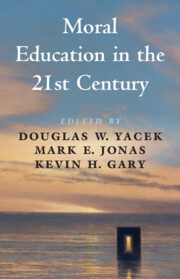Book contents
- Moral Education in the 21st Century
- Moral Education in the 21st Century
- Copyright page
- Contents
- Contributors
- Acknowledgments
- Chapter 1 Why Does Moral Education Matter in the 21st Century?
- Part I Historical Insights for Contemporary Moral Education
- Chapter 2 Plato’s Significance for Moral Education
- Chapter 3 Neo-Aristotelianism and Moral Education
- Chapter 4 Neoskepticism and Moral Education
- Chapter 5 Nietzsche and Moral Education
- Chapter 6 Neo-Kantianism and Moral Education
- Part II New Approaches to Moral Education
- Part III Responses to Contemporary Moral Problems
- Index
- References
Chapter 4 - Neoskepticism and Moral Education
from Part I - Historical Insights for Contemporary Moral Education
Published online by Cambridge University Press: 01 June 2023
- Moral Education in the 21st Century
- Moral Education in the 21st Century
- Copyright page
- Contents
- Contributors
- Acknowledgments
- Chapter 1 Why Does Moral Education Matter in the 21st Century?
- Part I Historical Insights for Contemporary Moral Education
- Chapter 2 Plato’s Significance for Moral Education
- Chapter 3 Neo-Aristotelianism and Moral Education
- Chapter 4 Neoskepticism and Moral Education
- Chapter 5 Nietzsche and Moral Education
- Chapter 6 Neo-Kantianism and Moral Education
- Part II New Approaches to Moral Education
- Part III Responses to Contemporary Moral Problems
- Index
- References
Summary
Contemporary moral education could learn a thing or two from the ancient Greco-Romans. This essay introduces the two major varieties of ancient Skepticism: Pyrrhonism and the New Academy, situating them within the current resurgence of interest in virtue ethics that includes, for instance, Stoicism. I then make an argument that the Academic Skeptics – authors like Carneades and Cicero – pursued two major intertwined interests: ethics and natural philosophy. “Ethics,” in the Greco-Roman conception, had a far wider scope than the field of study that we now identify by that label, having to do with how to best live one’s life. In turn, a crucial component of good living was thought to be the ability to understand, through natural philosophy, how the world actually works, in order to avoid taking refuge in psychologically reassuring fantasies of the kind that we refer to nowadays as pseudoscience.
- Type
- Chapter
- Information
- Moral Education in the 21st Century , pp. 49 - 68Publisher: Cambridge University PressPrint publication year: 2023



